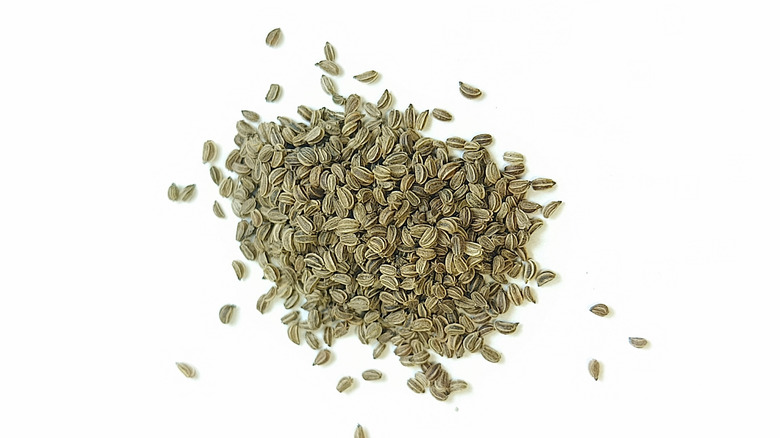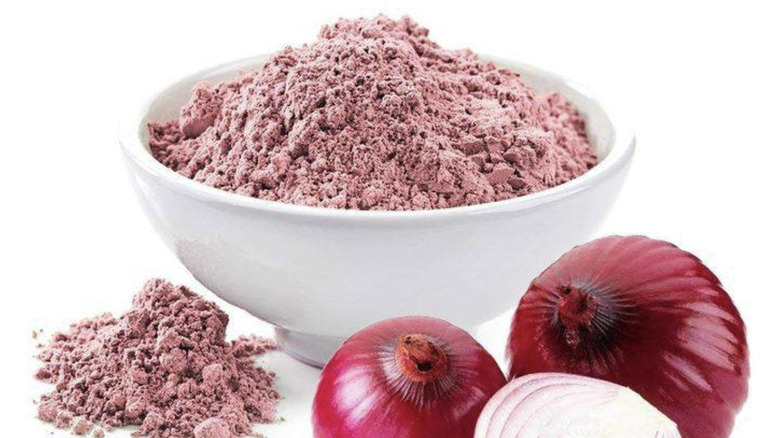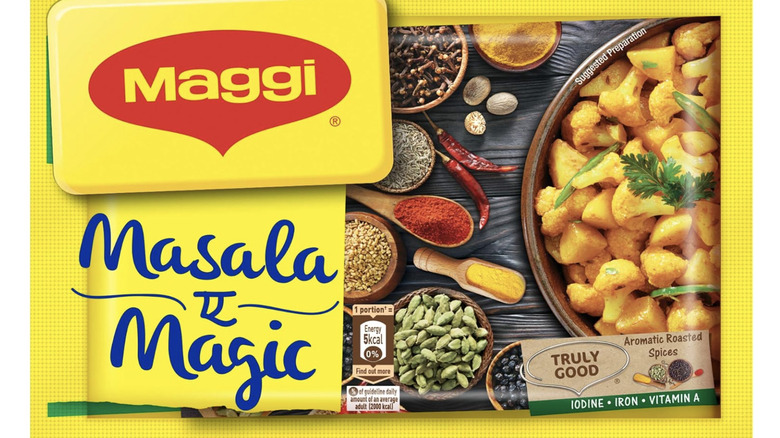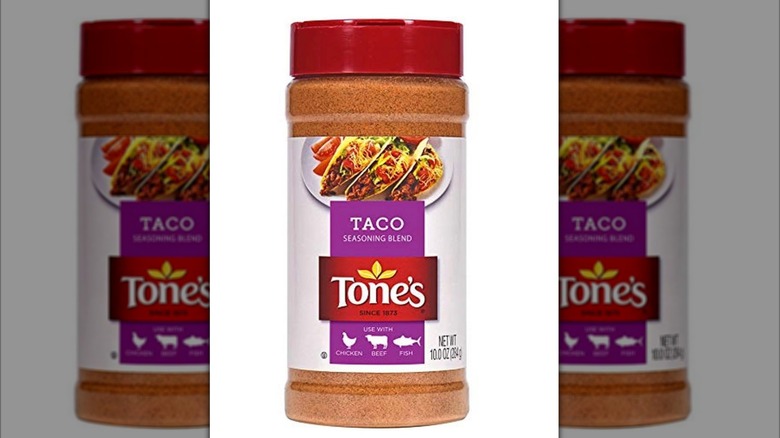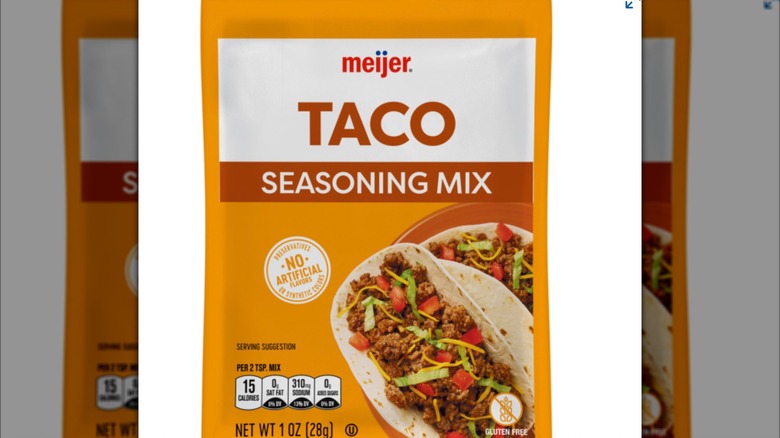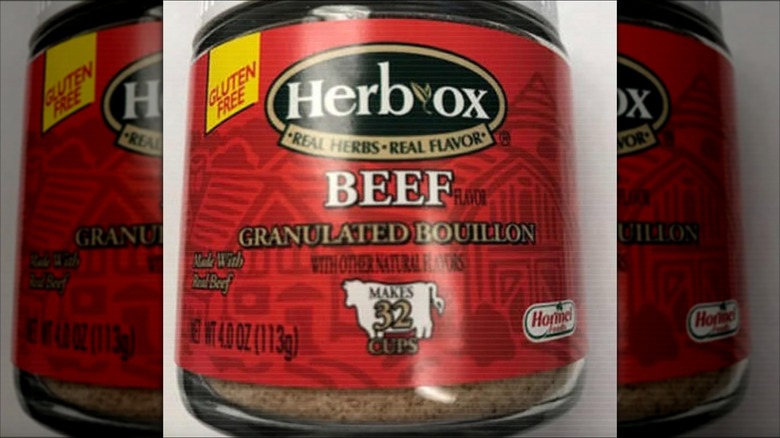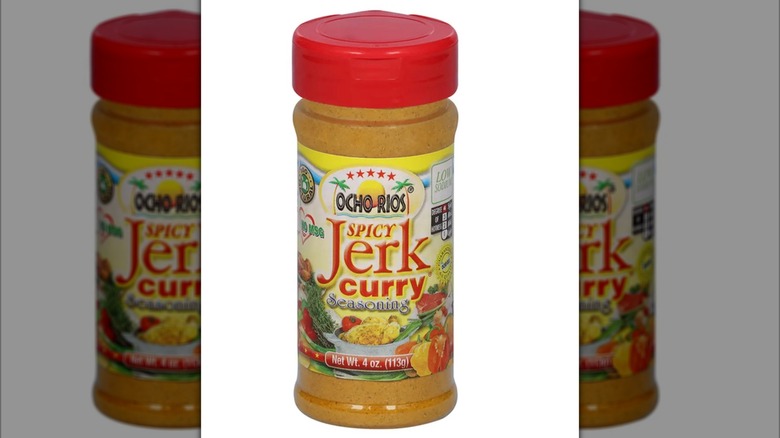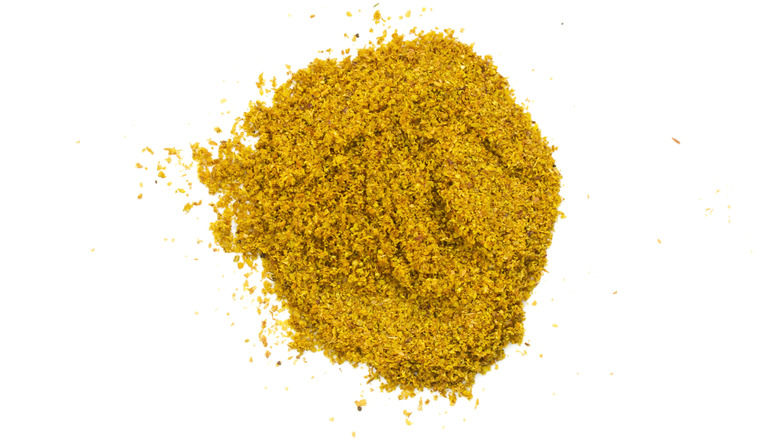12 Spice And Herb Recalls That Affected Millions
We may receive a commission on purchases made from links.
For many home chefs, herbs and spices are a go-to in the kitchen. Not only do different herbs and spices add layers of flavor, aroma, and color to dishes, but they also provide potential health benefits. For instance, turmeric (which gives Mcdonald's Filet-O-Fish its golden color) has anti-inflammatory properties, ginger can be used to treat gastrointestinal issues and alleviate nausea, and hot peppers deliver antioxidants.
With popularity also comes risk, however. Spices and herbs aren't always as safe as they seem. In fact, these pantry essentials have been the subject of numerous recalls over the years due to a range of safety concerns. Whether it's from issues such as undeclared allergens or contamination with salmonella and lead, various brands of herbs and spices have triggered some of the most serious recalls in the food industry.
Ready to find out more about some of the biggest herb and spice recalls in U.S. history? Take a look at this detailed roundup.
QST Ingredients and Packaging recalls seasoning products due to potential contamination with foreign object (2025)
In August 2025, QST Ingredients and Packaging recalled nearly 20,000 pounds of seasoning after discovering that it was contaminated with metal fragments. The four tainted products included Reduced Sodium Roast Beef Rub, BBQ Riblet Seasoning, Lemon Pepper Seasoning, and Cajun Seasoning. The spices had been shipped to four customers in Southern California and one in Texas. These buyers then either repackaged the seasoning under their own brands or used it in their products, which means that the contamination could have spread into other food items.
An FDA report stated that the impacted products were delivered to Serv-Rite, Cargill Meat, and Tarantino. Cargill Meat announced its own recalls earlier in 2025, one for pork carnitas and the other for liquid eggs. Notably, the carnitas were pulled from the shelves due to contamination with metal fragments. At the end of the day, the FDA gave the QST Ingredients and Packaging seasoning recall a Class II designation, highlighting "a situation in which use of, or exposure to, a violative product may cause temporary or medically reversible adverse health consequences or where the probability of serious adverse health consequences is remote."
The Whole Herb Company recalls organic whole celery seeds due to possible salmonella contamination (2025)
Founded in 1975, the Whole Herb Company is a supplier of more than 3,000 different spices, botanicals, and tea ingredients, including celery seeds. Used to add an earthy flavor to dressings, sauces, soups, and stews, celery seeds are also frequently added to seasoning blends. In 2025, the Whole Herb Company announced a recall of nearly 25,000 pounds of its organic whole celery seeds after concerns arose that they might be contaminated with salmonella. It's unclear how the contamination came to light.
Salmonella is a foodborne bacterium that can cause diarrhea, fever, and abdominal cramps in healthy adults. The pathogen can be particularly debilitating for the elderly, young children, and people with weak immunity, leading to high fever, lethargy, blood in the urine or stool, or even death. Given the serious nature of the recall, the FDA graded it Class I, indicating "a situation in which there is a reasonable probability that the use of or exposure to a violative product will cause serious adverse health consequences or death."
Newly Weds Foods recalls seasoning over potential salmonella contamination (2023 and 2024)
With 30 plants around the world, Newly Weds Foods is a force to be reckoned with. The company specializes in marinades, sauces, seasonings, breadings, and batters. Newly Weds Foods also offers food safety products, such as DefenStat, an ingredient designed for raw meat and poultry that inhibits E. coli and salmonella growth. Considering its commitment to food safety, it's quite ironic that the company recalled its products due to possible salmonella contamination both in 2023 and 2024.
The 2023 recall was huge, involving a staggering 6,465,115 pounds of products, including seasoning rubs, as well as marinades, batters, and breaders. The products had been shipped to 28 states and Canada. A year later, in 2024, Newly Weds Foods recalled nearly 60,000 pounds of seasoning due to concerns over salmonella contamination. More specifically, the recall centered on four products — Steak and Burger Seasoning, Starch WPC Blend, and two types of breaders — which were distributed in Florida, Illinois, and Texas. The FDA classified both incidents as Class I recalls, the most serious designation, indicating a high risk of illness from the contaminated products.
Olam Food Ingredients recalls onion powder over fears of salmonella contamination (2023)
Established in 2020, Olam Food Ingredients focuses on plant-based, healthy, and sustainably sourced ingredients. These include cocoa, coffee, dairy, nuts, as well as herbs and spices. In 2023, Olam Food Ingredients came under pressure after announcing a recall of its Onion Powder Premium due to potential salmonella contamination. Onion powder, which you can make with the skins, is a multipurpose seasoning often used to enhance the flavor of soups, stews, sauces, and marinades. It's also often found in packaged and processed foods such as potato chips and powdered soups.
All in all, Olam Food Ingredients pulled nearly 43,000 pounds of onion powder from supermarket shelves in Canada, Arkansas, and Illinois. The product was sold as a bulk ingredient in 44.9- and 50-pound fiber bags. It's unclear at what state of the manufacturing process the pathogen entered the onion powder and whether any consumers fell ill after consuming the product. Highlighting the severity of the incident, the FDA gave the recall a Class I designation, reserved for situations where consumption could lead to serious health issues or death.
Amin Trading Agency recalls Everest and Maggi brand spices due to possible salmonella contamination (2023)
In 2023, Amin Trading Agency was found to be in violation of the Foreign Supplier Verification Program after importing spices from India that were missing the proper labeling for sale in the United States. However, the company's troubles didn't stop there. The offending products also tested positive for salmonella during an FDA inspection.
The recall affected three different masala blends, often used in Indian dishes and beverages such as curries and chai. The list of impacted products included Everest Garam Masala, Everest Sambhar Masala, and Maggi Masala ae Magic. The recalled products were shipped to grocery stores in Georgia, North Carolina, Ohio, Maryland, Tennessee, Texas, Mississippi, Florida, Virginia, New Jersey, and New York. Amin Trading Agency destroyed all the leftover products under the supervision of the FDA. It's unclear how the salmonella ended up in the product.
B&G Foods recalls Tone's Taco Seasoning Blend due to undeclared allergen (2021)
Relatively fast to make and packed with flavor, tacos are a versatile dish that can be filled with anything from grilled meat to crispy roasted vegetables. Pre-mixed taco seasoning, which contains all the ingredients you need, can make the preparation process even easier. Beyond tacos, the same seasoning can also be sprinkled into soups, casseroles, or even scrambled eggs. In an unfortunate turn of events, in 2021, B&G Foods made headlines after recalling Tone's Taco Seasoning Blend due to undeclared wheat. The 23-ounce containers of the product were sold in Sam's Club stores nationwide.
In total, B&G Foods recalled nearly 4,000 cases of Tone's Taco Seasoning Blend after discovering a packaging error. More precisely, some containers of Tone's Taco Seasoning Blend were mislabeled on the back as Lemon Pepper Seasoning Blend, which failed to list wheat as one of the ingredients. The FDA lists wheat as one of the nine major allergens, alongside milk, fish, eggs, shellfish, tree nuts, peanuts, soybeans, and sesame. The concern was that people with wheat allergies could unknowingly ingest it and suffer adverse reactions, such as difficulty breathing, hives, or even anaphylaxis.
Makzemo recalls Balquis Yemeni Spice because of overly high levels of lead (2019)
Lead isn't deliberately added to food. Instead, the heavy metal can be present in the environment where food is farmed or manufactured, seeping into the crops. The FDA monitors the levels of lead in products to protect consumers from accidental overexposure. In 2019, Makzemo recalled Balquis Yemeni Spice after the FDA found that the seasoning could be contaminated with excessive levels of the toxin.
Yemeni spice — which blends ingredients such as black pepper, cardamom, cumin, coriander, turmeric, and cinnamon — is typically used in Yemeni and Israeli cooking. Makzemo's Balquis Yemeni Spice was sold in grocery stores and supermarkets in Michigan and New York. The yellowish spice was packaged in clear plastic containers and plastic bags. It's unclear how the spice came to contain elevated lead levels. No adverse health effects were linked to the product at the time of the recall.
McCormick & Company recalls Meijer taco seasoning due to undeclared milk (2018)
Undeclared ingredients are one of the leading causes of food recalls – and it's not hard to see why. While they aren't harmful to most consumers, undeclared allergens can trigger severe reactions in sensitive individuals. Even a common ingredient like milk can be fatal if ingested by someone with a dairy allergy. Such a labeling error led to McCormick & Company's 2018 recall of Meijer Taco Seasoning Mix, which contained milk not listed on the package. The 4 ½-ounce bottles of seasoning were shipped to Michigan, Kentucky, Indiana, Illinois, Ohio, and Wisconsin. No allergic reactions were linked to the seasoning at the time of the recall.
Notably, in 2016, McCormick & Company recalled its taco seasoning for exactly the same reason: undeclared milk. This time the product in question was Club Size McCormick Original Taco Seasoning Mix. More specifically, the 24-ounce containers of the product were accidentally filled with Original Taco Seasoning, which contained whey — one of the proteins found in milk. At the time of the recall, one consumer reported suffering an allergic reaction after consuming the product.
Creative Contract Packaging recalls HERB‑OX Beef Flavor Granulated Bouillon due to undeclared ingredient (2017)
Beef-flavored seasoning powder is a popular way of deepening the flavor of dishes without resorting to broth. Easily dissolved in water, beef bouillon is typically added to soups, stews, sauces, and gravies. In 2017, beef seasoning became the subject of controversy after Creative Contract Packaging recalled HERB‑OX Beef Flavor Granulated Bouillon due to the presence of an undeclared ingredient: milk. The issue came to light during a standard label inspection. While no allergic reactions were linked to the seasoning powder, Creative Contract Packaging pulled 4,412 cases of the product "out of an abundance of caution."
Creative Contract Packaging is no stranger to recalls. In 2010, the company announced a recall of its HERB-OX Bouillon products due to potential contamination with salmonella. The health alarm was sparked after Basic Food Flavors recalled its Hydrolyzed Vegetable Protein dry powder — a product that was used in the production of HERB-OX beef, chicken, and vegetable granulated bouillon — due to the presence of salmonella.
Oriental Packing recalls curry powder products due to lead contamination (2016)
Blending spices such as cumin, turmeric, ginger, and black pepper, curry powder is used to add flavor to soups, stews, vegetables, meat, and seafood. In 2016, Oriental Packing issued a recall of this pre-mixed spice blend due to potential contamination with lead. The problem was discovered after testing by the New York State Health Department. In total, Oriental Packing pulled 377,000 pounds of curry seasoning from grocery store shelves nationwide. The recalled products included Blue Mountain Country Mild Curry Powder, Jamaica Hot Curry Powder, Ocho Rios Spicy Jerk Curry Seasoning, Oriental Mild Curry Powder, and Grace Hot Curry Powder.
Ingesting lead can lead to lead poisoning, with the adverse effects dependent on the amount of lead, duration of exposure, and the health of the individual exposed to the heavy metal. Prolonged exposure to small amounts of the toxin can also lead to health issues. Symptoms of lead poisoning may include vomiting, abdominal pain, seizures, coma, or even death.
Spices USA recalls Tasty Sawa Ground Turmeric due to fears over elevated lead levels (2016)
A staple in Indian and Southeast Asian cuisines, turmeric is used to add flavor to curries, fresh and leftover rice dishes, and marinades. This orange-hued root is also praised for its medicinal qualities, including anti-inflammatory properties and antioxidant content. In 2016, Spices USA pulled its Tasty Sawa Ground Turmeric from the market, after FDA tests found that it contained excessive lead.
Packaged in 50-pound bags, Tasty Sawa Ground Turmeric was sold in Florida and New York, as well as the Dominican Republic, France, Colombia, Jamaica, and Barbados. In total, the company recalled nearly 40,000 pounds of the product, which had been imported into the U.S. from India. Since Spices USA wasn't involved in the processing of the seasoning, it was suspected that the lead contamination originated in India. The FDA gave the Tasty Sawa Ground Turmeric recall a Class I designation, pertaining to products that carry the potential for long-term health effects and even death.
Adams Flavors recalls cumin products due to undeclared peanuts (2014 and 2015)
When cooking with cumin, the last thing any consumer probably expects to ingest is ground peanuts. However, this is precisely what happened when Adams Flavors recalled its cumin in December 2014. The alarm was raised after a supplier notified Adams Flavors that a spice ingredient they had sold them was contaminated with peanut protein — an allergen not listed on the label. By mid-2015, over 675 food products were affected by the cumin recall, including spices, burgers, and taco kits. According to the FDA, 32 reports of allergic reactions were tied to the tainted products.
It's unclear whether the mishap was just an accident or something more sinister. However, Steve Taylor, co-director of the Food Allergy Research and Resource Program at the University of Nebraska, told Allergic Living in April 2016 that he believed the contamination was the result of deliberate adulteration. "I have a very strong suspicion that [the peanut in cumin] was intentional because the levels were so high," he said. To clarify, some of the recalled products contained 5% peanut, with one item showing contamination levels as high as 10%. Following the fiasco, a Texas woman who became ill from a recalled chili kit sued its manufacturer Reily Foods Co., but later settled the case.


